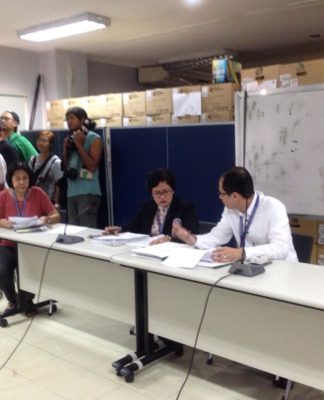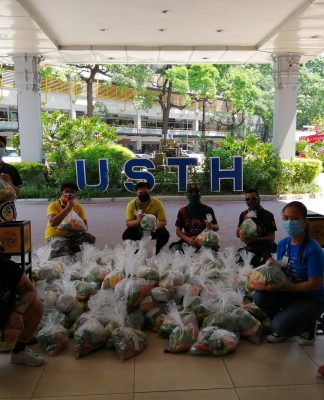CONTRARY to perception, high school students whose parents are working abroad tend to be more active in school and focused in their studies, thereby limiting the school drop-out rate, a recent study by the UST Social Research Center (SRC) has shown.
In the study titled “Determining the Social Costs of Overseas Filipino Workers’ Remittances: A Check through Education Indicators,” SRC chief Alvin Ang found that children of overseas Filipino workers (OFWs) are more determined to graduate.
The study also discussed how remittances have changed the social, moral and ethical conditions of the country, with remittances now the core strength of the Philippine economy and the largest source of foreign exchange.
In 2007, the Philippines received an estimated $15 billion in remittances, approximately 10% of the GDP, and the highest level in 20 years.
The Philippines is the third largest recipient of remittances in the world next to India and Mexico.
Leslie Ann Fabello, a freshman Legal Management student from the Faculty of Arts and Letters, said that despite the absence of her father, she had survived the demands of secondary education and now strives meet the demands of university life.
“My father has been working as a seaman for more than ten years and his absence challenged me to excel in school, not just to meet his expectations, but also to make my mother and siblings proud,” Fabello told the Varsitarian.
Using regression analysis, Ang compared the school performance of students across 16 regions in the country. The study involved students who were “worse off in terms of attention, time, and money.”
Ang admitted that his presumption was for the children to be lax and less serious in their academics, but the results revealed otherwise.
The study rebutted the 2005 study of the Center for Migrant Action (CMA), which stated that “overseas migration has presumably become the single biggest cause of family disintegration.”
Ang’s study also showed that students perform better when it is the mother working abroad.
“When a female parent leaves the country for work, dropout rates decrease while participation and cohort survival or the completion of the current educational level increases,” Ang told the Varsitarian.
Ang clarified that he was not encouraging Filipino mothers “to migrate” to improve the academic performance of their children.
Sought to comment, Precious Velasquez, board member of the Philippine Association for Sociology of Religion, explained that mothers working abroad tend to become assertive by indirectly communicating to their children the value of education and their hard work overseas.
“Knowing that the Filipino culture dictates that it should be the father working for the family, the children are now affected by the realization that it is the mother who is working for living,” Velasquez told the Varsitarian.
The study also found that children ages 7 to 12 years old do not go to school due to lack of interest, the high cost of education, inability to cope with school work, and the location of the school.
Students 13 to 16 years, meanwhile, do not attend school also due to lack of interest, and the high cost of education, as well as the need to find a job, and household chores.
Maximize remittances
In a conference organized by the Philippine Institute for Development Studies last Sept. 23, SRC research associate Jeremaiah Opiniano and Fernando Aldaba, chairman of the Ateneo Department of Economics, said the country should maximize gains from remittances while protecting the rights and welfare of overseas Filipino workers, which they described as the country’s “most important development assets.”
OFWs have contributed to the economic survival of the country despite internal problems in politics and the financial system, they said in the paper titled “Maximizing the Philippine Diasporic Dividend.”
Aldaba said the country can benefit from OFWs through remittances that go to investments on education or business, the transfer of skills acquired by OFWs abroad, networks and market links, and political activism.
To control the development of international migration, the country must exploit socio-economic sectors where OFWs channel their remittances, Opiniano said. These are agriculture, education and health, infrastructure development, financial markets, communication and technology, and tourism.
Managing remittances
An SRC forum at the Thomas Aquinas Research Complex Auditorium last September 30 tackled the importance of remittances and how these should be carefully handled now that most countries are experiencing the effects of the global financial crisis.
During the forum, Opiniano said remittances are usually spent to cover the increasing costs of basic needs such as food, clothing, shelter, health, and education.
A 2004 Asian Development Bank survey found that the average remittance of an OFW is $340 (Php 16,632.79) every month.
Families of the OFWs could help discourage the “migration” of their loved ones by investing in banks or microfinancing institutions.
An OFW should also think of his or her own welfare while working overseas, he said.
“The OFW should have insurance upon working abroad. Above anything else, they should be thinking about their health and security,” Opiniano said.
















Dear Sir/Madam:
Greetings of peace in the Year of Our Lord 2011!
We are QTV-11 Life and Style with Ricky Reyes. This February 13, 2011, we will be featuring an episode in honor of Valentines Day. In line with this endeavor, we would like to request for the contact details of Ms. Precious Velasquez to seek her professional opinion on the topics of male libido, man’s need for multiple sexual partners, healthy and dysfunctional jealousy, and healthy and dysfunctional relationships.
Please drop us your contact details so that we can arrange to communicate as soon as possible. If you would prefer to contact us, our lines are 0932.533.0140, 0916.707.9485 and 584 5048.
Please consider this request. Thank you and good day.
Yours truly,
Carla Camille Mendoza, RN
Researcher/Production Assistant
Life and Style with Ricky Reyes
QTV-11
You are so awesome! I don’t suppose I’ve read anything like this before.
So nice to find somebody with some unique thoughts on this topic.
Seriously.. thank you for starting this up. This
web site is one thing that is needed on the internet, someone with
a little originality!